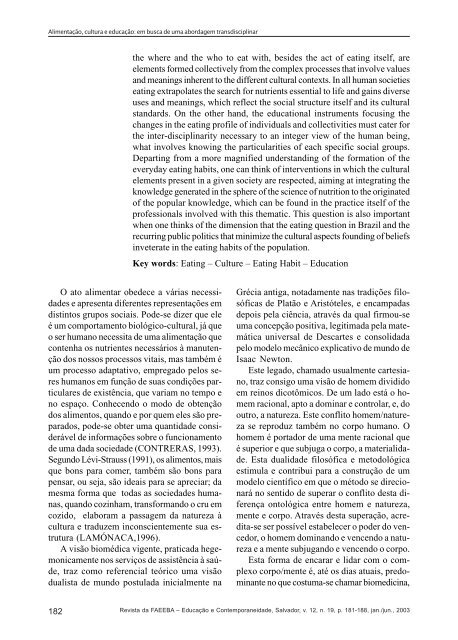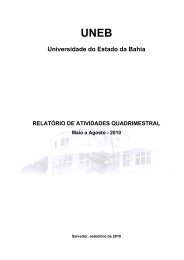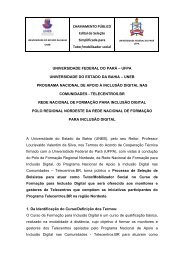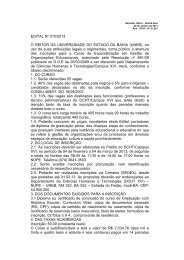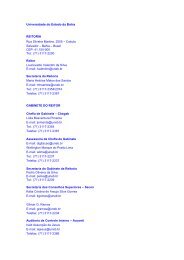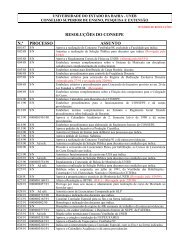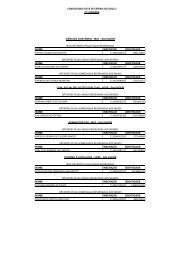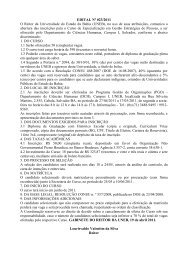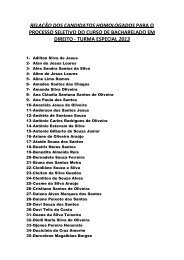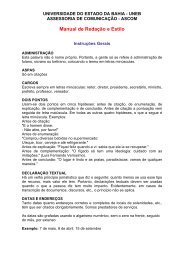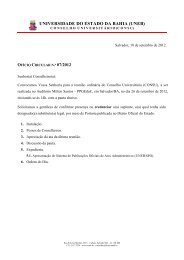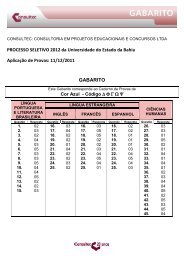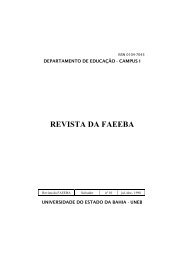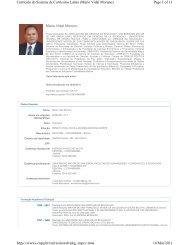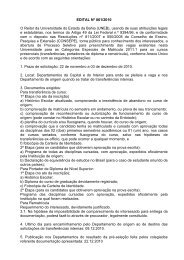Edição Nº 19 - Uneb
Edição Nº 19 - Uneb
Edição Nº 19 - Uneb
Create successful ePaper yourself
Turn your PDF publications into a flip-book with our unique Google optimized e-Paper software.
Alimentação, cultura e educação: em busca de uma abordagem transdisciplinar<br />
the where and the who to eat with, besides the act of eating itself, are<br />
elements formed collectively from the complex processes that involve values<br />
and meanings inherent to the different cultural contexts. In all human societies<br />
eating extrapolates the search for nutrients essential to life and gains diverse<br />
uses and meanings, which reflect the social structure itself and its cultural<br />
standards. On the other hand, the educational instruments focusing the<br />
changes in the eating profile of individuals and collectivities must cater for<br />
the inter-disciplinarity necessary to an integer view of the human being,<br />
what involves knowing the particularities of each specific social groups.<br />
Departing from a more magnified understanding of the formation of the<br />
everyday eating habits, one can think of interventions in which the cultural<br />
elements present in a given society are respected, aiming at integrating the<br />
knowledge generated in the sphere of the science of nutrition to the originated<br />
of the popular knowledge, which can be found in the practice itself of the<br />
professionals involved with this thematic. This question is also important<br />
when one thinks of the dimension that the eating question in Brazil and the<br />
recurring public politics that minimize the cultural aspects founding of beliefs<br />
inveterate in the eating habits of the population.<br />
Key words: Eating – Culture – Eating Habit – Education<br />
O ato alimentar obedece a várias necessidades<br />
e apresenta diferentes representações em<br />
distintos grupos sociais. Pode-se dizer que ele<br />
é um comportamento biológico-cultural, já que<br />
o ser humano necessita de uma alimentação que<br />
contenha os nutrientes necessários à manutenção<br />
dos nossos processos vitais, mas também é<br />
um processo adaptativo, empregado pelos seres<br />
humanos em função de suas condições particulares<br />
de existência, que variam no tempo e<br />
no espaço. Conhecendo o modo de obtenção<br />
dos alimentos, quando e por quem eles são preparados,<br />
pode-se obter uma quantidade considerável<br />
de informações sobre o funcionamento<br />
de uma dada sociedade (CONTRERAS, <strong>19</strong>93).<br />
Segundo Lévi-Strauss (<strong>19</strong>91), os alimentos, mais<br />
que bons para comer, também são bons para<br />
pensar, ou seja, são ideais para se apreciar; da<br />
mesma forma que todas as sociedades humanas,<br />
quando cozinham, transformando o cru em<br />
cozido, elaboram a passagem da natureza à<br />
cultura e traduzem inconscientemente sua estrutura<br />
(LAMÓNACA,<strong>19</strong>96).<br />
A visão biomédica vigente, praticada hegemonicamente<br />
nos serviços de assistência à saúde,<br />
traz como referencial teórico uma visão<br />
dualista de mundo postulada inicialmente na<br />
Grécia antiga, notadamente nas tradições filosóficas<br />
de Platão e Aristóteles, e encampadas<br />
depois pela ciência, através da qual firmou-se<br />
uma concepção positiva, legitimada pela matemática<br />
universal de Descartes e consolidada<br />
pelo modelo mecânico explicativo de mundo de<br />
Isaac Newton.<br />
Este legado, chamado usualmente cartesiano,<br />
traz consigo uma visão de homem dividido<br />
em reinos dicotômicos. De um lado está o homem<br />
racional, apto a dominar e controlar, e, do<br />
outro, a natureza. Este conflito homem/natureza<br />
se reproduz também no corpo humano. O<br />
homem é portador de uma mente racional que<br />
é superior e que subjuga o corpo, a materialidade.<br />
Esta dualidade filosófica e metodológica<br />
estimula e contribui para a construção de um<br />
modelo científico em que o método se direcionará<br />
no sentido de superar o conflito desta diferença<br />
ontológica entre homem e natureza,<br />
mente e corpo. Através desta superação, acredita-se<br />
ser possível estabelecer o poder do vencedor,<br />
o homem dominando e vencendo a natureza<br />
e a mente subjugando e vencendo o corpo.<br />
Esta forma de encarar e lidar com o complexo<br />
corpo/mente é, até os dias atuais, predominante<br />
no que costuma-se chamar biomedicina,<br />
182 Revista da FAEEBA – Educação e Contemporaneidade, Salvador, v. 12, n. <strong>19</strong>, p. 181-188, jan./jun., 2003


